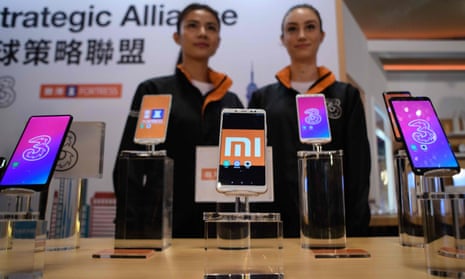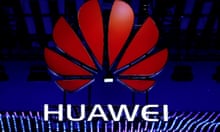The Smartphone maker Xiaomi will begin selling its smartphones in the UK under a partnership with Hutchinson’s Three as “China’s Apple” turns its attention to the west.
The news came as the firm announced its IPO on the Hong Kong stock exchange seeking to raise at least $10bn (£7.3bn), in what could be the largest offering since Chinese e-commerce conglomerate Alibaba’s $25bn listing in New York in 2014.
Xiaomi, the world’s fourth-largest smartphone maker, has made a name for itself selling high-end phones at rock-bottom prices but has been limited to China and other developing markets, such as India.
It made its first move into western Europe by debuting in Spain in November last year. The partnership with Hutchinson will lead to Xiaomi phones being sold through Three stores in the UK and Ireland, as well as Austria, Denmark, Hong Kong and Sweden.
“We have been watching Xiaomi’s success from afar and are impressed with the huge range of connected devices that they currently offer,” Three UK’s chief digital officer, Tom Malleschitz, said and added that it opens the door to Xiaomi’s other connected devices such as smart home appliances.
Xiaomi’s $10bn fundraising could value the company at up to $100bn, making it the third largest Chinese tech firm by value behind so-called “national champions” Tencent and Alibaba.
Xiaomi is the top-selling smartphone brand in India ahead of Samsung and the fourth globally in the first quarter of 2018 behind Samsung, Apple and Huawei, according to the analysts IDC. However, the firm made a a loss of $6.9bn last year.
The eight-year-old company first cultivated a following in China by selling imitations of Apple’s iPhone at half the price of the real products, which resulted in it being hit with threats of patent infringement that were seen as keeping Xiaomi out of the west.
Xiaomi describes itself as the “triathlete” of Chinese tech firms. Most of its revenue come from smartphone sales, sold at a low-profit margin. The rest comes from selling smart household gadgets – Xiaomi rice cookers, scooters or air conditioners – and online services such as entertainment and financial service apps.
In an open letter included in the filing, the 48-year-old founder, Lei Jun, acknowledged the company’s struggles in 2016 when phone sales declined as competitors churned out cheaper options.
“It was clear to us that because we grew so quickly in our early years, we did not have an adequately strong foundation to face all the challenges in front of us at the time,” Lei wrote.
The company invested in businesses involved in lifestyle and internet of things products, and Lei asked his co-founder to step aside so he could take over as the supply chain chief. Between 2015 and 2017, sales increased by 70% to 114.6bn yuan ($17.9bn), according to the filing.
Xiaomi still depends on China for the majority of its revenues, a challenge given that that market is nearing saturation. For the first time in five years, smartphone shipments dipped below 100m in the first quarter of this year. Xiaomi phones are popular with first-time buyers but shoppers often upgrade to Apple’s iPhone or other phones in later purchases.










